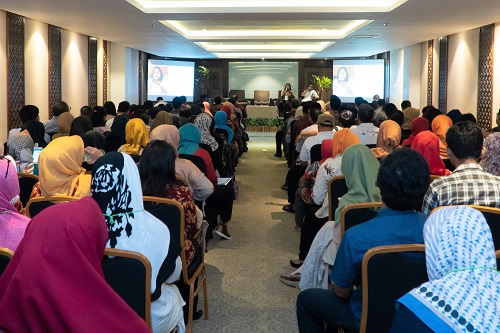Community Involvement Improves Student and Teacher Performance
19 November 2018
The KIAT Guru Pilot Program* shared its experiences of the dynamic impact that community involvement in primary school education can have in improving education quality in very disadvantaged areas, in a talkshow and exhibition during the recent Eastern Indonesia Forum Festival (Forum KTI) VIII. Held in Makassar on 24-25th October 2018 the festival aimed to disseminate local development innovations and smart practices from Eastern Indonesia.
The talkshow was attended by 147 participants from Eastern Indonesia, including community representatives, education observers, local governments and other development partners. During the forum, participants from South Sulawesi, Papua and West Papua provinces expressed their interest in implementing KIAT Guru’s community involvement mechanism in their areas.
 |
 |
| Participants attend the KIAT Guru talk show (Makassar, 24/10), ‘Community Involvement Improves Students Performance’, at the Eastern Indonesia Forum Festival. |
School User Committees Drive Improvements in Student and Teacher Performance
With the theme of “Involved Community, Improved Students Performance”, the KIAT Guru Pilot talk show discussed the key roles that school stakeholders—School User Committees (especially parents), school principals and local government—have in driving improvements in both teacher and student performances. The role of active School User Committees (KPLs) is especially crucial to driving improvements.
“KPL members take turns to observe service delivery in schools and check relevant documents. We work on seven basic principles: voluntary, accountability, transparency, independent, professional, proportional and cooperation,” said Alfiana Pamut, respected community figure and KPL member in Compang Necak Village, Manggarai Timur, East Nusa Tenggara.
Elfrida, principal of SDN Bea Nanga elementary school in Manggarai Timur, emphasized the important role of KPLs in empowering village school communities to keep local education service providers accountable. “In the beginning, KPL members often feel inferior to monitor teachers and principals, so that schools must step in to encourage them. Yet teachers must be open and supportive of the KPL’s duties, not only to evaluate teachers but to help teachers identify their weaknesses in delivering their services,” she said.
Such cooperation and openness has resulted in improved performances of both teachers and students. “Teachers attend school more often now and fulfill their service agreements, for example, by using learning props that students are eager to learn with. Student-teacher relationships have also improved. This is related to the teacher agreement to ban corporal punishment and violence at schools,” said Alfiana.
“Several months ago, I led our community to hold a [KIAT Guru Pilot Program] Diagnostic Test and the results show a significant improvement in student academic achievements,” she added.
Elfrida noted, “The service agreements between teachers and her school community and the use of KIAT Kamera to record teacher’s presence at school have also increased teacher attendance, and teachers are now more creative in making classes more fun and enjoyable,” she said.
Parents have also become more aware of their roles in their children’s education through the KIAT Guru pilot program, Alfiana Pamut added. “Parents now realize they have the right to monitor education implementation as stipulated in Law No. 20/2003 [on National Education System]. Their awareness makes KPL members more confident to evaluate teacher performances,” she said.
Commitments and Challenges to Replicating the KIAT Guru Pilot Program
Director General for the Disadvantaged Region at the Ministry of Villages, Disadvantaged Regions and Transmigration Samsul Widodo, said the KIAT Guru program should be disseminated to other disadvantaged districts, “Good practices in allocating Village Funds for community empowerment activities in the education sector [such as KIAT Guru’s] need to be spread to other villages. Our Ministry, TNP2K, and the Ministry of Education and Culture are all working to replicate KIAT Guru’s initiatives, especially in looking for ways to utilize the Village Fund to support community empowerment,” he said.
Head of Sintang Development Planning Agency, Kartiyus, said the KIAT Guru pilot has helped his district in the following ways:
- It has prepared both local government apparatus and village school stakeholders to confidently replicate the program independent of outside governance.
- It has assisted local government to find a suitable model to link community empowerment with improvement state civil apparatus performance, in this case teachers.
- And it is in line with the district vision and mission to produce a smarter generation of children.
“Sintang is ready to allocate funds from the District and Village Budgets in 2019 to replicate the KIAT Guru program independently in over 60 additional schools in our very disadvantaged regions,” said Kartiyus.
“Village government supported the program by participating in monthly evaluation meeting and providing Rp20 million fund for KPL activities in this year,” Alfiana further said.
Martinus from the Manggarai Timur Office of Community and Village Empowerment (DPMD), shared how KIAT Guru has become the model program for Village Fund utilization for community empowerment development in his district. However, he noted that whilst villages have the authority to use Village Funds for proven models of community empowerment, like KIAT Guru, government guidance is still needed to help villages access knowledge and expertise about such programs.
At the conclusion of the talk show, primary school principal Elfrida proposed that there are no major obstacles in providing the best education for children, saying, “If we are committed, we can make it, regardless of the school, its situation or condition.”
* KIAT Guru (Teacher Performance and Accountability) Pilot aims to improve education service delivery in remote villages by empowering communities and tying payment of remote area teacher allowances with either teacher presence or teacher service quality. The pilot is a collaboration between the Ministry of Education and Culture, the National Team for the Acceleration of Poverty Reduction (TNP2K), and the governments of five districts with disadvantaged villages. Yayasan BaKTI implements the program with technical supports from the World Bank and funding from the Government of Australia and USAID.
